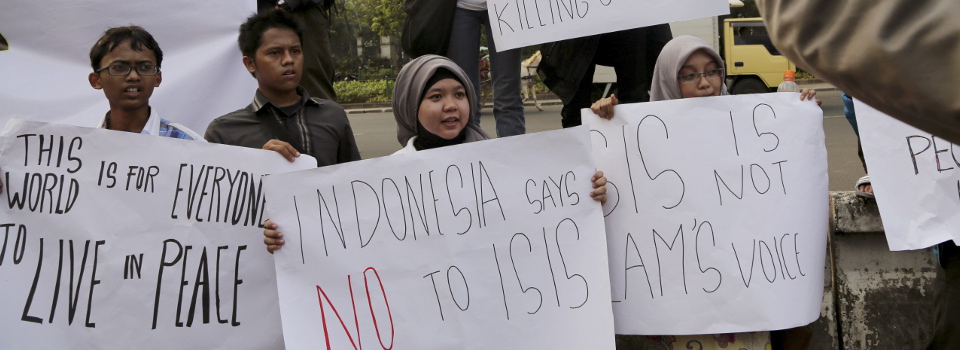As the Islamic State of Iraq and Syria (ISIS) destabilises the Middle East, South-east Asia is likely to become the second front of the war on terror again. More than any other country, Indonesia will play a key role in keeping the region safe.
A recurrence is probable now as the ISIS attracts recruits and sympathisers in Indonesia, Malaysia and Singapore. It has been estimated that Indonesia provided most of the 200 or so South-east Asian jihadists who have joined the insurgent group. Worryingly, there is even a local group, the Malay Archipelago Units for the Islamic State, which supports ISIS; it could be the harbinger of a refashioned and revitalised JI.
I feel a sense of déjà vu in all this. As a journalist based in Jakarta at the dawn of this century, I watched with horror and disbelief as the country’s secular fabric, an intrinsic part of the Pancasila state that the authoritarian Suharto years had preserved with vigour, was attacked mercilessly in the heady era of democratic liberation.
What were terrifying were not only the mega bomb attacks carried out by the JI, directed mainly at foreigners, but also the organised attacks on religious minorities launched by paramilitary outfits such as the Laskar Jihad, which was viciously active in the Maluku islands. Almost every month, the question I asked myself was: Is Indonesia headed for an Islamic state?
That scenario did not materialise. Instead, militant Islamic groups embodied by the JI inflicted sufficient damage on the Indonesian polity to attract sustained retribution. International support was forthcoming for Jakarta’s anti-terror moves, the iconic edge of which was represented by the anti-terror unit Detachment 88; it played a key role in locating and neutralising militant outfits before they could launch attacks.
Today, the ISIS has the potential of equalling, if not exceeding, Al-Qaeda as an international threat. Unlike Al Qaeda, the ISIS actually controls territory. By some accounts, it rules areas of Iraq and Syria the size of Britain. Al-Qaeda was an ideology; the ISIS is geography as well.
That geography is not only physical, but also existential. When the ISIS leader Abu Bakr al-Baghdadi proclaimed the establishment of the Caliphate with himself as its head, many dismissed his gesture as little more than an antic. However, he tapped into a deep vein of Muslim sentiment worldwide. The abolition of the Caliphate in 1924, following the collapse of the Ottoman Empire in 1922, signified a collective Muslim defeat at the hands of European imperialism. Since then, the restoration of the Caliphate has aroused expectations among devout Muslims who hope for a single global centre of Islamic political and religious authority to unite Muslims into a civilisational force capable of taking on the West. Though al-Baghdadi’s claim to be the Caliph is contested because his ascension was self-declared, jihadists in Algeria, Egypt, Libya, Saudi Arabia and Yemen have sworn allegiance to him and his Caliphate.
Al-Baghdadi himself has broadcast the international scope of his ambitions by reaching out in his speeches to Muslims “suffering” in China, India, Palestine, Somalia, the Arabian peninsula, the Caucasus, the Levant, Egypt, Iraq, Indonesia, Afghanistan, the Philippines, Iran, Pakistan, Tunisia, Libya, Algeria and Morocco.
In Indonesia, the attractiveness of the Caliphate is conjoined with the extremist readiness to take up arms for the establishment of an Islamic state. Scholars Navhat Nuraniyah and Sulastri Osman note that, in Indonesia, the declaration of the Caliphate has had two results: “First, it has injected new impetus into the notion of qital tamkin, armed warfare aimed at gaining territorial control rather than merely at attacking the enemy (qital nikayah). Second, it has contributed to the growth of Indonesian ISIS supporters beyond those who populate the militant Islamist circles.”
Essentially, the threat to South-east Asia from the ISIS is two-fold. First, insurgents have travelled to Syria from Indonesia, Malaysia and Singapore to fight there and eventually to return home to destabilise their societies. Terror cells will metastasise, launching attacks on new areas of the body politic.
Second, there is a larger issue of South-east Asian Muslims who might not travel to the Middle East but who are willing and capable of taking on the state locally on the imported strength of the jihadist belief that a global struggle is on between Islam and its detractors.
If these two strands continue to infect South-east Asian politics, events in the Middle East will bear directly on the region. And if so, Indonesia will hold the key to a resolution, as it did with the JI.
The “hardware” of security – the breaking up of cells preparing for attack – will remain the centrepiece of anti-terrorism efforts. Here, Jakarta’s anti-terror programme is hampered by the lack of laws, which Malaysia and Singapore have, that allow detention without trial. The argument for civil liberties, while legitimate, must not obscure the real need for preventive legal action against terrorists.
The “software” of security is no less important. Mainstream Muslim leaders must continue to try and prevent religious schools from producing the next bunch of warriors and extremists. Suggestions to bring hate speech within the purview of anti-terror legislation must be considered seriously. Charismatic clerics and other radical preachers should not be allowed to act with impunity in encouraging Indonesians to support groups with terrorist objectives. Jakarta needs to act more firmly against terror before the region becomes a second front, a second time.

